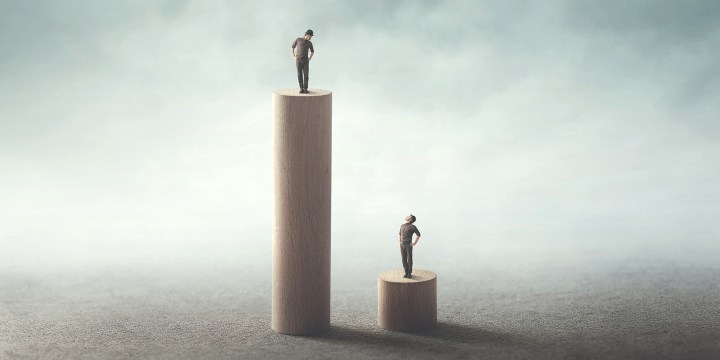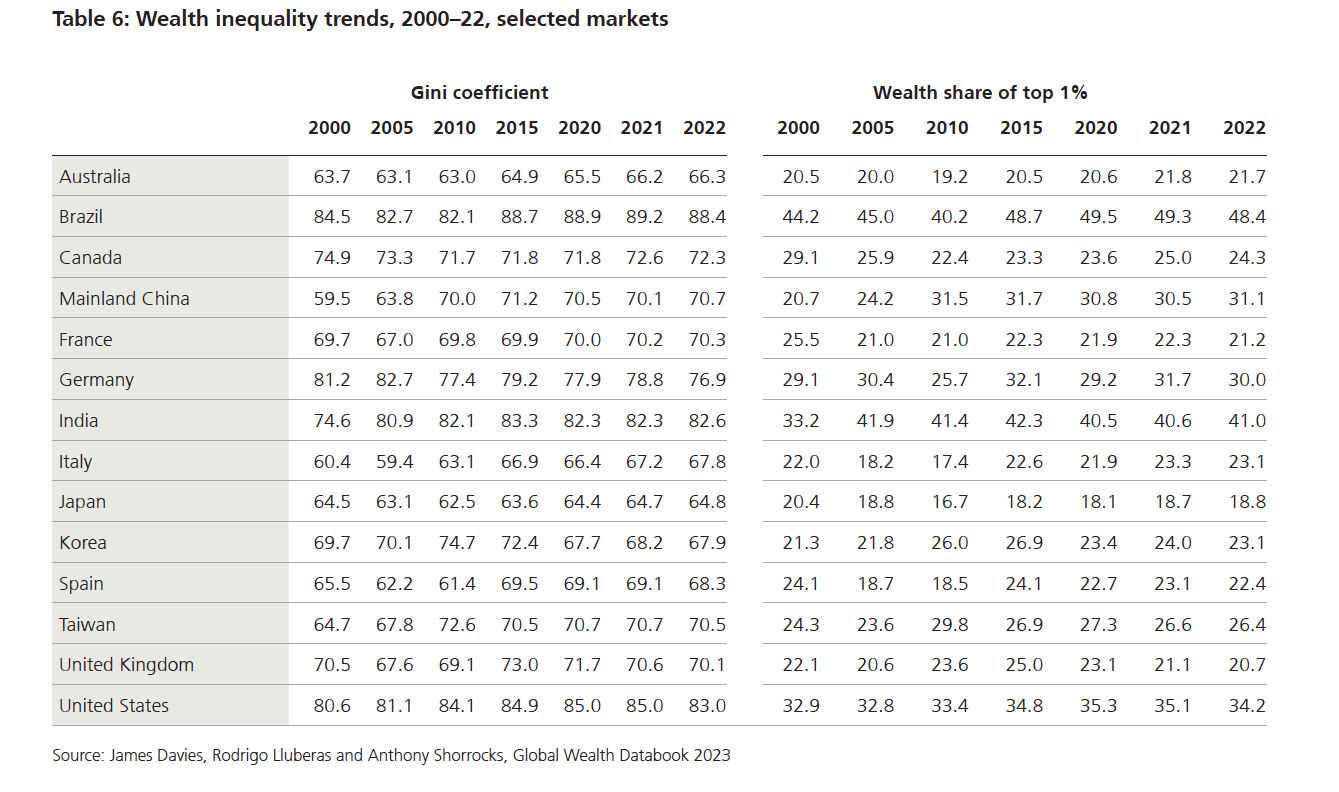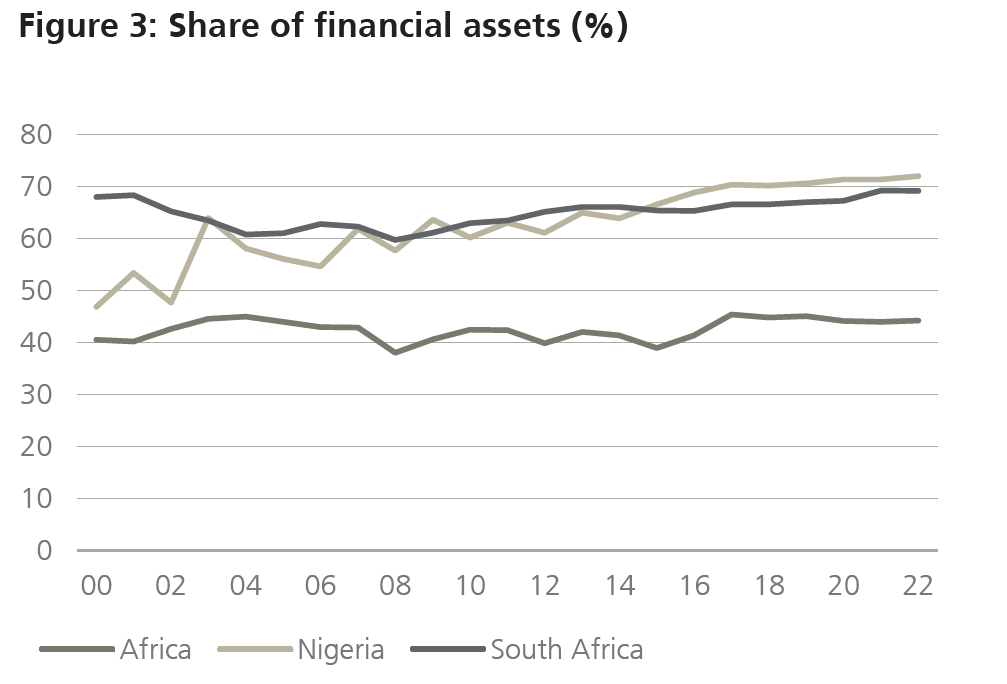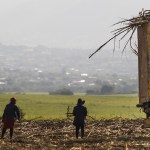GLOBAL WEALTH REPORT
South Africa’s wealth inequality has increased markedly over past two decades – UBS

Wealth inequality in South Africa has risen significantly over the past two decades, according to the latest UBS Global Wealth Report published this week.
The terrible trifecta of poverty, unemployment and inequality is casting a long shadow over South Africa’s stagnant economy and, by most measures, things are only improving marginally – or worsening.
On the wealth front – which refers to the value of the assets you own – inequality has been on the rise, according to the UBS Global Wealth Report for 2023. It compares South Africa with Nigeria as the pair represents Africa’s largest economies.
“At the end of 2022, the Gini coefficient for wealth was 86.5 in Nigeria and 88.8 in South Africa, up from 72.1 and 80.4, respectively, in 2000.”
So, South Africa’s Gini coefficient for wealth has risen to 88.8 from 80.4 over that period, and these figures are quite stark. Like the Gini measurement for income distribution, 0 represents absolute equality and 1 – or 100 – represents absolute inequality.
The bottom line: The haves have got more and the have-nots have got less.
South Africa also tops the global charts on income inequality and unemployment, which are not the topics of this report. The UBS report does not provide a comprehensive global ranking on the wealth inequality score, but it does provide a table with a Gini wealth ranking for a few selected markets.
At 88.8, South Africa tops all of those, with Brazil – also famed for its rates of inequality – ranking second at 88.4.
So, it’s probably safe to say that this is at least another podium performance for South Africa, if not a gold medal. This speaks volumes to the ANC’s stated three-decade quest to lessen poverty, unemployment and inequality.
It is worth noting that Nigeria’s inequalities in wealth have risen faster, spiking to 86.5 in 2022 from 72.1 in 2000. If you’re outpacing South Africa on this track, then you know your affluent class is on steroids.
“Currently, the composition of assets in South Africa has changed relatively little since the year 2000, when financial assets were 68.1% of gross assets. Today, they make up 69.2% of the total,” the report says.
So, the financial sector in South Africa does not seem to be directly the driving force behind this rise in inequality.
This is pointedly not the case in Nigeria, which provides some clues to the source of the steroids propelling its wealthy.
“In Nigeria, the share of financial assets rose from 46.9% in 2000 to 72.1% by year-end 2022 … Wealth inequality has trended upward in Nigeria this century in line with the large increase in the relative importance of financial assets in household portfolios. The share of the top 1% reveals a similar story in Nigeria, increasing from 28.3% to 44.5% over these years.”
South Africa’s top 1% has been by comparison a relative laggard in the accumulation stakes.
“The share of the top 1% in South Africa rose slightly from 39.0% to 42.2%,” the report says.
Meanwhile, the vast majority of South Africans acquired a shrinking slice of the wealth pie at an accelerating rate.
“The share of low-wealth groups declined more sharply (in South Africa). The share of the bottom 90% of wealth holders as a whole fell from 29.8% to 19.1%.”
This means that at the end of 2022, 1% of South Africa’s population accounted for 42.2% of the country’s wealth, while 90% accounted for 19.1%.
“The trend toward greater wealth inequality is not representative of Africa as a whole, which saw a small drop in the Gini coefficient from 88.6 in 2000 to 87.1 in 2022, and a fall in the share of the top 1% from 46.9% to 43.8%,” the report also says.
Among other things, such findings are likely to lead to renewed calls for a wealth tax and other measures for redistribution.
Governance is also clearly playing a role here. It’s no coincidence that the South African and Nigerian states are both riven with corruption, which robs the state of the ability to fulfill its functions in crucial areas such as education.
In a society with low levels of skills and education, those that have skills and education are going to simply have far more prospects for employment, higher income levels and the accumulation of wealth than those who don’t.
A recent PwC report highlighted that point for South Africa.
Read more in Daily Maverick: Unskilled workers more vulnerable in SA’s depressed labour market – PwC data
South Africa’s unemployment rate declined marginally in the second quarter of this year to a still eye-popping 32.6%. But the expanded definition, which includes discouraged jobseekers, was 42.1% and in North West province it was 53.5%. This is testimony to an economy that is unable to absorb new entrants into the labour market, not least because so many of them have no marketable skills.
In short, poverty, unemployment and inequality in South Africa are a reflection in many ways of a failing state. DM




















As the national economy has grown less than 3% over the same time period, would it imply that misappropriation and corruption have driven this situation?
Not necessarily, there’s wealth inequality in most (all?) countries. The main cause is likely systemic injustice. Economics, like nature, isn’t fair. That said, misappropriation and corruption aren’t helping the situation.
It may add perspective to look at some other countries in comparison: The US went from 80.6 to 83, UK 70.5 -> 70.1, Australia 63.7 – > 66.3, and even China from 59.5 -> 70.7. So wealth inequality seems to be a global thing, and the upwards trend is relatively consistent too.
Fair statement, Mr. Docker. However, what is striking about countries like Brazil, South Africa, or Nigeria, is where they ARE … They START with that huge built in inequity and it grows from there. Even the US goes from a relative ‘low’ of 80 to 83 …